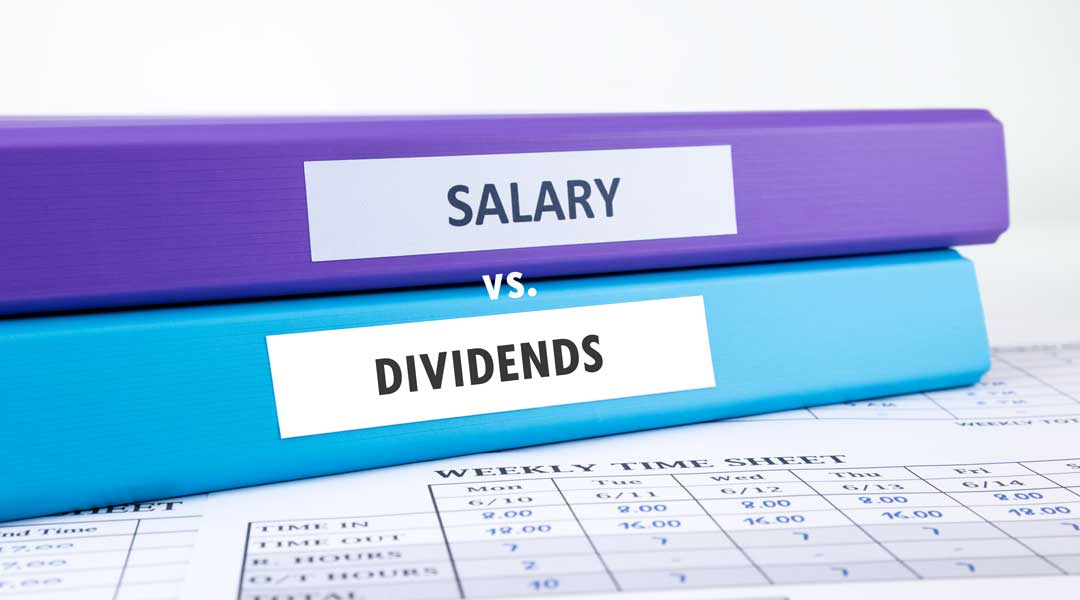
Shareholder Owners Salaries vs Dividends. Which Method is Better for You?
When is it better to pay yourself a salary vs. dividends as the owner/manager of a corporation?
Each method has pros and cons, and as a business owner, you should be aware of your options before deciding on what is better for your unique tax situation and why. The following article will help you understand the difference between your options and why one might be better for your tax situation.
Salary – Pros
- Salary is considered employment income which will increase RRSP contribution room and allow you to contribute to CPP.
- Paying a salary allows the owner to take advantage of certain personal tax deductions, such as childcare expenses.
- When a bonus is declared at year-end, there is an opportunity for personal tax deferral since the salary does not need to be paid for six months.
- Declaring a salary can reduce corporate taxable income and is used in tax planning to decrease income below the $500k small business limit or so the company has nil taxable income.
Salary – Cons
- If the company is considering obtaining financing, it could be affected since a salary would decrease the company’s financial results.
- If a bonus is declared and not paid right away, some people run into issues six months later if they have cash flow issues and cannot pay the bonus at that time.
- Salaries do not have a preferential tax treatment, so they will likely pay more personal tax than if a dividend is declared.
- Paying a bonus or salary comes with a higher cost since you must factor in employer and employee portions of CPP.
- Operating a payroll account involves more compliance costs and hassles.
Dividends – Pros
- Earning dividend income personally has a preferential tax rate.
- If the company is considering obtaining financing for the business, having a higher net profit on the financial statements would be preferable to show potential lenders that the company is more profitable.
- Depending on the year-end of the company, declaring a dividend could provide a personal tax deferral till the personal tax deadline in April.
- It is easier to pay a dividend than a salary (no source deductions required).
- Dividends can be declared anytime, allowing you to optimize your tax situation.
Dividend – Cons
- Earning dividend income does not create RRSP room, nor will you be contributing to CPP.
- Declaring a dividend does not provide a deduction to reduce corporate income.
- The taxpayer would incur a loss on certain personal tax deductions if no salary is earned, such as childcare expenses.
There is no easy answer to which is better between salary and dividends. The answer depends on each taxpayer’s preferences, how much cash you require personally from your company, corporate tax results, personal tax deductions, and retirement planning. If you are struggling to determine which method is best for you or would like assistance analyzing your tax situation, this is where we come in. After assessing your life situation and goals, we can point you in the right direction so you are set for success!
Contact RGB Accounting today at (416) 932-1915 or email us at [email protected] if you are looking for expert advice on shareholder loans. We will get an in-depth understanding of your specific situation and make sure you are set for success!
Other related articles:
Newsletters
Newsletter – March 2019
NewslettersEvents & SponsorshipArticles & Publications
Newsletter – February 2019
NewslettersEvents & SponsorshipArticles & Publications
Newsletter December 2018
NewslettersEvents & SponsorshipArticles & Publications
Newsletter November 2018
NewslettersEvents & SponsorshipArticles & Publications
e-Newsletter – August 2018
NewslettersEvents & SponsorshipArticles & Publications
Events & Sponsorship
No Results Found
The page you requested could not be found. Try refining your search, or use the navigation above to locate the post.
Articles & Publications
Strategies to consider when buying a second property
Strategies to consider when buying a second property. There are three common types of second properties people are looking at when they wish to buy a second property: cottages, income properties and U.S. real estate. COTTAGE PROPERTIES If you've been looking to buy a...
Incorporating your Business in Canada
Tax Advantages of Incorporating your Business in Canada Incorporating your business may lead to lower taxes depending on your particular situation and the province in which you operate. Incorporating can save you money once the business generates more income than you...
How much is child benefit in Canada per month?
How much is child benefit in Canada per month? For each child: under six years of age: $6,833 per year ($569.41 per month) 6 to 17 years of age: $5,765 per year ($480.41 per month). Will child benefit increase in 2021? On July 20, the Minister of Families, Children...
Is Cryptocurrency Taxable in Canada?
Is cryptocurrency taxable in Canada? According to CRA, possessing or holding a cryptocurrency is not taxable. However, selling, making a gift, trading or exchanging a cryptocurrency, including disposing of one to get another, or converting cryptocurrency to a...
Have Unfiled Tax Returns For Years?
Do You Have Unfiled Tax Returns For Years? As for the record, the CRA wants you to file and pay your taxes on time every year. When you cannot do so, you may put yourself at risk of high penalty amounts and collection tasks like bank levies or wage garnishments. We at...